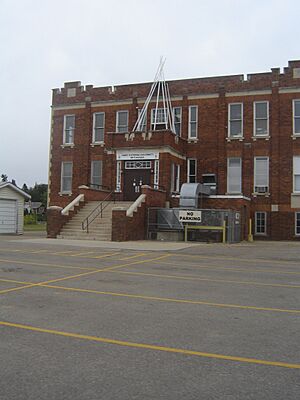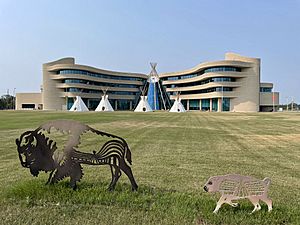First Nations University of Canada facts for kids
 |
|
|
Other names
|
Saskatchewan Indian Federated College (1976–2003) |
|---|---|
| Type | Federated college |
| Established | May 1976 |
|
Academic affiliation
|
University of Regina |
| President | Jacqueline Ottmann |
| Location |
,
Canada
50°25′10″N 104°34′56″W / 50.41944°N 104.58222°W |
| Campus | Regina campus Saskatoon campus Prince Albert campus |
| Affiliations | AUCC |
The First Nations University of Canada (FNUniv) is a special university in Saskatchewan, Canada. It is connected to the University of Regina. FNUniv has three campuses: in Prince Albert, Regina, and Saskatoon. It offers many different programs, including ones focused on Indigenous cultures and practices.
The university started as the Saskatchewan Indian Federated College (SIFC). It was created in May 1976. This happened through an agreement between the Federation of Sovereign Indigenous Nations and the University of Regina. In June 2003, the school was renamed FNUniv. Its new Regina campus opened later that same year.
Contents
History of FNUniv
The First Nations University of Canada began as the Saskatchewan Indian Federated College (SIFC). SIFC became connected with the University of Regina in 1976. This connection was made to help meet the "academic, cultural and spiritual needs of First Nations' students."
On June 23, 2003, the school changed its name to FNUniv. This happened under the leadership of university president Eber Hampton. Prince Edward, Earl of Wessex opened the university's Regina campus in 2003. Queen Elizabeth II, who was the Queen of Canada, visited the university in 2005. This was her first event during the 100-year celebrations of Saskatchewan and Alberta.
Queen Elizabeth II gave a special stone to the university. She said it came from Balmoral Castle in Scotland. She explained that it showed the rights of First Nations peoples. These rights were part of treaties signed with the Crown during Queen Victoria's time. The stone has symbols of both Queen Victoria and Queen Elizabeth II. It reminds everyone of the special bond between the Queen and all First Nations peoples.
The Star Blanket Cree Nation has suggested a plan for the university's land. They want it to become an Urban Indian reserve. This plan is part of a land agreement involving the Star Blanket Nation, Saskatchewan, and the Canadian government. In 2008, members of the Star Blanket Nation voted to support this idea.
FNUniv Campuses
FNUniv has three main campuses:
- Regina Campus: Located at 1 First Nations Way, Regina. It is on the same grounds as the University of Regina.
- Saskatoon Campus: Found at Asimakaniseekan Askiy Urban Reserve 230 – 103B Packham Avenue.
- Northern Campus: Located at 1301 Central Ave, Prince Albert.
The top two and a half floors of the Regina campus building were once rented out. They were used as office space by Aboriginal Affairs and Northern Development Canada until 2014. The Regina campus building was designed by the famous architect Douglas Cardinal.
Each FNUniv campus has its own library. These libraries have many books and resources related to the subjects taught at each campus. For example, the Regina campus library focuses on Indigenous Studies and Fine Arts. The Saskatoon campus library specializes in Indigenous Social Work. The Prince Albert campus library focuses on Indigenous Health Studies and Education.
Since 1976, the FNUniv libraries have been connected with the University of Regina library. Students and teachers at FNUniv can use all the FNUniv libraries. They can also use the University of Regina library and libraries at other connected colleges like Campion and Luther.
Learning at FNUniv
Even though it is called the First Nations University of Canada, it is a special college of the University of Regina. This means that degrees you earn at FNUniv are actually given by the University of Regina. The law that allows this is called The University of Regina Act. FNUniv welcomes students from all cultures and countries. It is not just for students of First Nations background.
Special Programs for Indigenous Students
The university has created special programs with Indigenous communities. These programs help meet the needs of Indigenous communities in areas like health, education, and the environment. Examples include programs in Dental Therapy, Nursing, and Health Studies.
There are also special first-year programs to help Indigenous students get started. Aboriginal Elders are present on campus to offer support and guidance. FNUniv also has a career services program. This program helps Indigenous students with their job and career goals.
Student Life and Support
Students at the Regina campus of FNUniv pay the same fees as University of Regina students. Like students at other connected colleges (Luther and Campion), FNUniv students can use all the University of Regina's facilities. This includes libraries, book stores, clubs, parking, and labs. They can also use services like meal plans, student housing, and career counseling. The degree programs at FNUniv match up with the courses at the University of Regina.
Financial Help for Students
The Government of Canada has a tool to help students find money for school. It lists over 680 scholarships, bursaries, and other ways to get financial help. These are offered by governments, universities, and businesses. They help Indigenous, First Nations, and Métis students go to college.
FNUniv also offers many scholarships for these students. Some of these scholarships include:
- Adam Dreamhealer Prize
- Albert Bellegarde Memorial Scholarship
- Ayahkamimakan Pimatisiwin (Life Continues) Bursary
- Bobby Bird Memorial Scholarship
- Dr. Oliver Brass Graduate Studies Award
- Dr. Suzanne Marcia Nilson Scholarship in Biology
- Grain Services Union Bursary
- Hudson's Bay Company Student Achievement Award for Excellence
- Information Systems Management (ISM) Scholarship
- Jean Shoebridge Memorial Book Prize
- Many Nations/Maritime Life Assurance Award
- Margaret and Clare Sherrard Friendship Scholarship
- Mary Ahenakew Memorial Scholarship Award
- Meyers Norris Penny LLP Scholarship
- Molson Entrance Scholarship
- Paul J. Dudgeon Memorial Scholarship
- SGI Stan Hamilton Scholarship
- Solomon Mosquito Scholarship in English
- Wendy Swenson Memorial Scholarship
See also
- Alfred Young Man, former department head of Indian Fine Arts
- Higher education in Saskatchewan
- Blue Quills University
- List of tribal colleges and universities
 | Janet Taylor Pickett |
 | Synthia Saint James |
 | Howardena Pindell |
 | Faith Ringgold |




